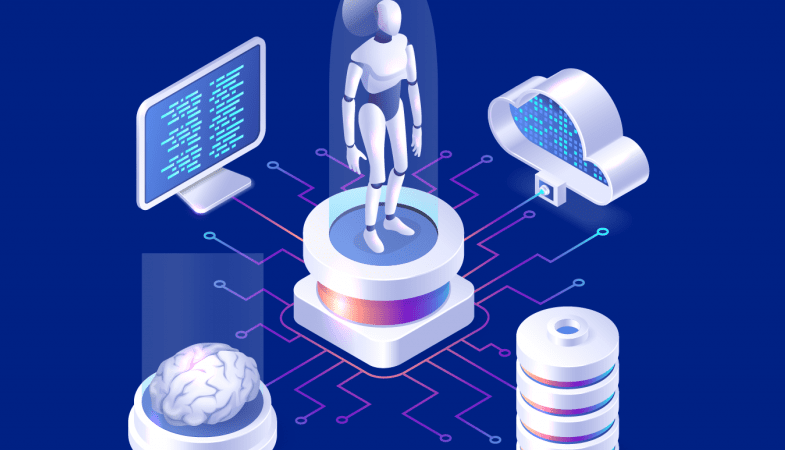AI for Business Case: Why Your Company Needs AI

Introduction
AI for Business Case is no longer a futuristic concept. It has firmly established itself as a transformative technology that can elevate your business. Whether you operate in the tech industry or a traditional brick-and-mortar business, AI has the potential to drive growth, improve efficiency, and enhance your competitive edge. In this blog post, we’ll delve into the compelling business case for AI, exploring why your company needs AI and how it can revolutionize your operations, customer interactions, and overall success.
Enhanced Customer Experience
In the age of digital commerce and hyper-personalization, delivering an exceptional customer experience is paramount. AI can be pivotal in understanding customer behavior, preferences, and expectations.
Here’s how AI can enhance the customer experience
a. Personalization: AI-driven algorithms analyze customer data to deliver personalized product recommendations, content, and marketing messages. This not only increases conversion rates but also fosters customer loyalty.
b. Chatbots and Virtual Assistants: AI-powered chatbots and virtual assistants provide round-the-clock support, answering customer queries, resolving issues, and streamlining the customer support process.
c. Predictive Customer Service: AI can predict customer service needs based on historical data and proactively address issues before they escalate, ensuring a seamless experience.
d. Real-time Analytics: AI can analyze customer feedback, social media interactions, and sentiment analysis, helping businesses make real-time adjustments to meet customer expectations.
Improved Operational Efficiency
AI can revolutionize your company’s operations, automating repetitive tasks, optimizing processes, and reducing operational costs.
Here are some ways AI can improve efficiency
a. Automation: AI can automate routine and time-consuming tasks, such as data entry, invoice processing, and inventory management, freeing employees to focus on more strategic activities.
b. Predictive Maintenance: AI analyzes data from machinery and equipment to predict when maintenance is needed, minimizing downtime and reducing repair costs.
c. Supply Chain Optimization: AI can optimize supply chain logistics, from demand forecasting and inventory management to route planning, resulting in cost savings and improved efficiency.
d. Employee Productivity: AI tools can assist employees by providing insights and recommendations, helping them make informed decisions more efficiently.
Data-Driven Decision Making
In today’s data-driven world, making informed decisions based on data is crucial for business success. AI can sift through vast amounts of data, providing valuable insights and aiding in strategic decision-making.
Here’s how AI supports data-driven decision-making
a. Data Analysis: AI-powered analytics tools can process and analyze data quickly and accurately, uncovering trends, correlations, and opportunities that might be overlooked.
b. Predictive Analytics: AI can predict future trends, customer behavior, and market conditions, enabling businesses to proactively adjust strategies and seize opportunities.
c. Market Research: AI automates market research by analyzing social media trends, consumer sentiments, and competitive landscape, helping companies stay ahead of the competition.
d. Risk Assessment: AI can evaluate risk factors and provide insights to guide investment decisions, loans, and insurance underwriting decisions.
Competitive Advantage
Staying ahead of the competition is essential in today’s fast-paced business environment. AI can provide
your company with a significant competitive advantage in several ways
a. Product Innovation: AI can help businesses design innovative products and services by analyzing customer feedback, market trends, and emerging technologies.
b. Customer Insights: AI-powered data analysis can provide deep insights into customer preferences and pain points, allowing businesses to tailor their offerings to meet specific needs.
c. Marketing Efficiency: AI-driven marketing campaigns can reach the right audience with the right message at the right time, ensuring a higher ROI on advertising spend.
d. Operational Agility: AI can adapt to changing market conditions, enabling companies to quickly pivot and adjust their strategies in response to emerging opportunities or threats.
Scalability
One of the primary advantages of AI is its scalability. It can handle an increasing workload without a corresponding increase in labor costs. As your business grows, AI can adapt to the increased demands, whether in customer service, data analysis, or other areas of operation.
a. Customer Support: AI for Business Case, chatbots can handle an expanding customer base and provide consistent, high-quality service regardless of the volume of inquiries.
b. Data Processing: caAI for Business Case can process and analyze larger datasets as your business grows, ensuring you can maintain data-driven decision-making as you scale.
c. Marketing Campaigns: AI for Business Case can efficiently manage and optimize advertising campaigns across larger markets and customer segments.
d. Customer Insights: As your customer base expands, AI can continue to provide valuable insights into new customer segments and their preferences.
AI for Business Case and Risk Management
AI is a powerful tool for risk management in various industries, from finance to healthcare to supply chain management.
Here’s how it can support your risk management efforts
a. Fraud Detection: AI for Business Case algorithms can identify unusual patterns and behaviors, helping you detect and prevent fraudulent activities saving your company from financial losses.
b. Credit Scoring: AI-driven credit scoring models can evaluate the creditworthiness of individuals and businesses more accurately, reducing the risk of defaults.
c. Compliance Monitoring: AI for Business Case can analyze and monitor regulatory compliance, ensuring that your company adheres to industry-specific rules and regulations.
d. Predictive Analytics: AI for Business Cases can predict potential risks and issues, allowing businesses to implement preventive measures and minimize the impact of unforeseen events.
Conclusion
The AI for Business Case is compelling, and it’s not limited to tech giants or Silicon Valley startups. Companies of all sizes and across diverse industries can benefit from AI’s ability to enhance customer experiences, improve operational efficiency, drive data-driven decision-making, provide a competitive edge, support scalability, and aid in risk management. As AI technologies continue to advance, the opportunities for businesses to leverage this powerful tool will only increase. By embracing AI, your company can unlock new potentials and stay at the forefront of innovation and competitiveness in today’s ever-evolving business landscape. Don’t miss out on the transformative power of AI for Business Case – it’s a valuable investment in your company’s






